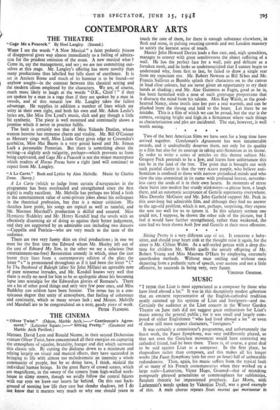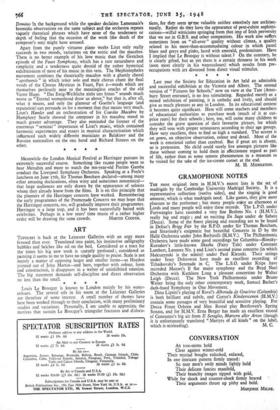MUSIC
" I uniqx that Liszt is most appreciated as a composer by those who have lived abroad a lot." It was in this deceptively modest aphorism that an eminent representative of the English-cathedral tradition neatly summed up his opinion of Liszt and foreigners—and me. Certainly the audience at the Liszt concert in the Winter Garden Theatre on June zoth did not suggest great enthusiasm for Liszt's music among the general public ; for it was small and largely com- posed of either Englishmen " who had lived abroad a lot " or-even of those still more suspect characters, " foreigners."
It was certainly a connoisseur's programme, and unfortunately the finest work, the Faust Symphony, was very indifferently played, so that not even the Gretchen movement would have converted my cathedral friend, had he been there. There is, of course, a great deal to be said against Liszt as a composer. In the first place, he rhapsodises rather than composes, and this makes all his longer works (the Faust Symphony lasts for over an hour) full of unbearable redundancies. Then, again, his music suffers from the typical fault of so many of his French contemporaries when they worked on a large scale—Lamartine, Victor Hugo," Gounod—that of mistaking pompously phrased generalities or commonplaces for sublimities, flatulent rhetoric for impassioned prophecy. Les Morts, with Lathennais's words spoken by Valentine Dyall, was a good example of this. A male chorus repeats Beati mortui qui moriuntur in Domino In the background while the speaker declaims Lamennais's bromidic observations on the same subject and the orchestra repeats vaguely rhetorical phrases which have none of the tenderness or depth of feeling that the occasion of the work (the death of the composer's son) might have aroused.
Apart from the purely virtuoso piano works Liszt only really succeeds in two moods, variations on the erotic and the macabre. There is no better example of his love music than the Gretchen episode of the Faust Symphony, which has a rare naturalness and simplicity and a tenderness quite devoid of the rather hysterical exhibitionism of most of his music in this vein. The Mephistopheles movement combines the theatrically macabre with a ghastly choral " apotheosis " in which tenor solo and male chorus chant the final words of the Chorus Mysticus in Faust, Part 2—words which are themselves perilously near to the meaningless oracles of the old Victor Hugo. " Das Ewig-Weibliche zieht uns hinan " sounds much worse as " Eternal womanhood draw us above," but that is, after all, what it means, and only the glamour of Goethe's language (and reputation) can persuade us for a moment that that means very much. Liszt's Hamlet and an orchestration of his Csardas Macabre by Humphrey Searle showed the composer in his macabre mood to much greater advantage. They also reminded the listener of the enormous " seminal " importance of Liszt's music, which contained harmonic experiments and essays in musical characterisation which influenced such widely different musicians as Balakirev and the Russian nationalists on the one hand and Richard Strauss on the other.
* * * *
Meanwhile the London Musical Festival at Harringay pursues its extremely successful course. Something like ro,000 people went to hear Menuhin and more to watch the ten-year-old Pierino Gamba conduct the Liverpool Symphony Orchestra. Speaking at a Foyle's luncheon on June 17th, Sir Thomas Beecham declared—among many other amusing declarations, often witty and sometimes nonsensical— that large audiences are only drawn by the appearance of soloists whom they already know from the films. It is on this principle that the planners of the Harringay concerts have worked. Remembering the early programmes of the Promenade Concerts we may hope that the Harringay concerts, too, will gradually improve their programmes. Harringay is a large trap, and it has been successfully baited with celebrities. Perhaps in a few years' time music of a rather higher order will be drawing the same crowds. MARTIN COOPER.































 Previous page
Previous page